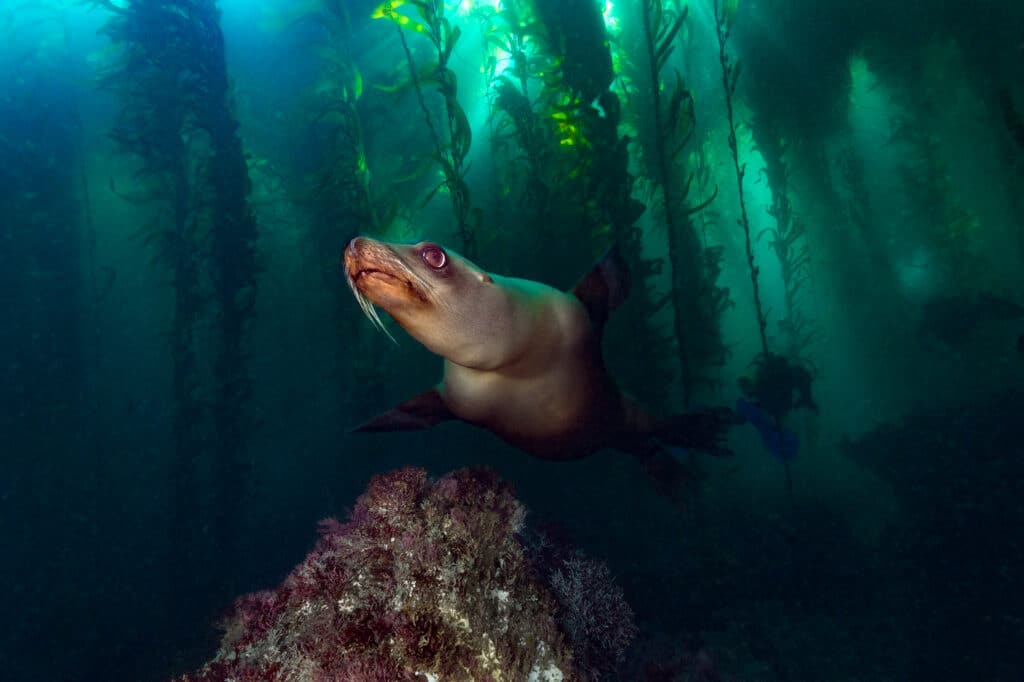As National Marine Sanctuary System Turns 50, Survey Finds Most U.S. Residents Want to Protect Ocean Ecosystems

 Why you can trust us
Why you can trust us
Founded in 2005 as an Ohio-based environmental newspaper, EcoWatch is a digital platform dedicated to publishing quality, science-based content on environmental issues, causes, and solutions.
On Sunday, October 23, the National Marine Sanctuary System turned 50. Since its founding, the system has protected more than 620,000 square miles of ocean and Great Lakes waters in 15 national marine sanctuaries and two marine national monuments.
And, just in time for the milestone, the National Marine Sanctuary Foundation has released a survey finding that U.S. residents across both political and geographic divides worry about the ocean and want to protect it, with 83 percent of respondents saying the ocean is very or extremely important for marine life and habitats and 82 percent favoring protections for underwater areas of educational, cultural or environmental significance.
“Americans, regardless of demographics, political parties, geographic location, care about the health of our ocean,” National Marine Sanctuary Foundation President and CEO Kris Sarri told EcoWatch.
Ocean Matters

The survey was funded by the National Marine Sanctuary Foundation and conducted by NORC at the University of Chicago. The researchers conducted 1,086 interviews with a representative sampling of U.S. adults between August 8 and 18.
What they found was that respondents cared about the oceans, knew they were struggling and thought more should be done to protect them.
The survey revealed a personal connection, with 62 percent of respondents visiting the ocean since 2019 and 86 percent of them saying the visit was good for their mental health. However, respondents didn’t need to live near the ocean to care about it.
“People often think there’s like the coast and then the heartland, and the heartland doesn’t care about the oceans,” Sarri said. “And this survey showed that that’s not the case. People actually do really care. They understand the connection there.”
While 83 percent of respondents understood the ocean was important for the life it contained, 80 percent recognized its role in clean air and 73 percent its role in regulating climate and weather. They were also aware that the ocean is facing many threats, with 43 percent rating its health as poor or very poor and only 16 percent believing it was good or very good.
Further, they thought businesses, the government and individuals were not doing enough to protect the oceans at 58 percent, 55 percent and 52 percent respectively. When broken down by policy, there was wide bipartisan support for a number of ocean protection efforts. For example, 92 percent of Democrats and 83 percent of Republicans favored measures to reduce water pollution, 90 percent of Democrats and 81 percent of Republicans favored protecting threatened and endangered marine species, 90 percent of Democrats and 83 percent of Republicans favored preventing pesticides and fertilizers from entering waterways and 90 percent of Democrats and 77 percent of Republicans favored protecting significant marine areas.
On the issue of protected areas in particular, 70 percent of respondents wanted them protected from oil and gas drilling, 69 percent wanted them protected from commercial fishing and 65 percent wanted them protected from mining. When broken down by party, a majority of Republicans still favored banning fossil-fuel extraction, commercial fishing and mining from protected areas at 56 percent, 68 percent and 52 percent respectively.
Knowledge Is Power

There were still some starker partisan divides caught by the survey when it came to ocean policies related to the climate crisis. Eighty-nine percent of Democrats but only 51 percent of Republicans favored reducing greenhouse gas emissions overall and 79 percent of Democrats but only 34 percent of Republicans favored reducing oil-and-gas extraction in the oceans. This matches up with the partisan divide on climate issues captured in other national surveys. However, there was also evidence that U.S. residents of all parties didn’t have a very deep understanding of the relationship between oceans and climate.
One of the most surprising findings for Rissi was the public’s overall lack of familiarity with the terms often used by ocean and environmental advocates. The survey asked respondents if they were very familiar with several key words, and these were some of the results:
- Climate change: 48 percent
- Sea level rise: 33 percent
- Overfishing: 28 percent
- Biodiversity: 21 percent
- Ocean acidification: 13 percent
- Blue carbon: nine percent
“People care greatly about this, but they don’t often understand the terms that we use,” Rissi said.
When it came to awareness of issues facing the ocean, there was much greater understanding of plastic pollution (78 percent) and overall water pollution (75 percent) than the climate crisis (59 percent.)
“They definitely were not aware of the fact that oceans absorb more of our carbon emissions than what takes place on land,” Rissi told EcoWatch. “And that’s a pretty critical issue.”
The knowledge gap means there is an opportunity for the National Marine Sanctuary Foundation and other conservation groups to better educate the U.S. populace about how climate change impacts the oceans. This could perhaps break through some of the political divide around the climate by connecting it to something the majority does seem to both understand and care deeply about.
There is a fair amount of political consensus around protecting public lands and national parks, for example, as Congress managed to pass the largest public lands bill in 10 years during the Trump administration with vocal support from both parties. The same amount of consensus might be built around marine protected areas if more people were aware that they existed and what they did.
“When people understand the connection to the land or to the water, you kind of go beyond just this kind of politics discussion around climate issues and you get people to understand, well, I want this place protected, I want to see this area so that my children can enjoy it,” Rissi said.
Further, people can be inspired to climate action when the places they love or the ecosystems they rely on begin to change. Rissi pointed to the example of shellfish fishers in Washington State who were forced to confront the effects of ocean acidification on their livelihoods.
“I think some people that wouldn’t necessarily recognize climate change do get to see it, and then they understand how they can take actions to prevent it as well,” she said.
The Next 50 Years
As the National Marine Sanctuary System turns 50, the foundation hopes to use the survey results to lobby for more and expanded national marine sanctuaries as well as to bolster their efforts to educate the public. However, the organization also hopes other ocean advocates will be able to use the findings.
“We put all the numbers out there because we want everybody to use this,” Rissi said. “Oceans need a voice in our city halls, in our corporate board rooms, in the halls of Congress, in presidential administrations.”
Amidst a global push to protect 30 percent of land and water by 2030, the National Marine Sanctuary Foundation is actually hoping to move beyond mere percentages. While 26 percent of U.S. waters are slated to be protected by 2030, less than two percent of that is in or along the continental U.S. The nonprofit is hoping to expand the types of habitats and ecosystems conserved so that a broad swath of U.S. coastal and Great Lake biodiversity is included. It also wants to increase connections, such as currents, between the protected areas.
There are already a host of beautiful and biodiverse marine sanctuaries, however, and not all of them are hard to access from the land. You can kayak in or watch wildlife from the shores of Monterey Bay – “the Serengeti of the sea” – ; Stellwagen Bank in Massachusetts is one of the best whale-watching sites in the U.S.; and the entire Florida Keys is a marine sanctuary.
For the more remote sanctuaries, the foundation tries to “bring these places to people” through visitor centers or online content, Rissi said.
“Not everybody necessarily is going to be a diver, or wants to go fishing, but they still love these places,” she said.
Subscribe to get exclusive updates in our daily newsletter!
By signing up, you agree to the Terms of Use and Privacy Policy & to receive electronic communications from EcoWatch Media Group, which may include marketing promotions, advertisements and sponsored content.

 233k
233k  41k
41k  Subscribe
Subscribe 




